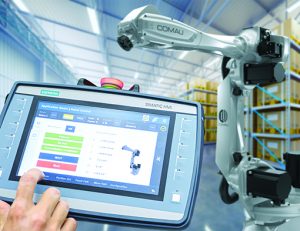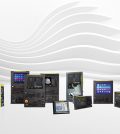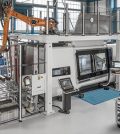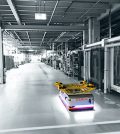Integration between robotics and PLCs with Comau and Siemens

At the event ‘The Integration of robotics and artificial intelligence in the PLC’ held last October 19, Comau and Siemens presented several application cases to demonstrate the concrete ability of Siemens PLCs to communicate at an industrial level with Comau robot controllers. The event was held at the MADE – Competence Center Industry 4.0 in Milan, created to support and accompany Italian manufacturing companies on the path of technological innovation and digital transformation.
Thanks to the Simatic Robot Library, which is available for PLCs or the Siemens Programmable Logic Controller S7-1500, and through the ‘Comau Next Generation Programming Platform’, an innovative platform found in Comau robot controllers, it is indeed possible to establish a connection based on the Profinet ‘Standard Robot Command Interface‘, a protocol that increasingly facilitates and improves the integration of Comau robots with Siemens programming and control systems.
During the event, the benefits of the seamless integration were highlighted, both for OEMs and final customers. The use of artificial intelligence algorithms to optimize robot handling, grasping and inspection processes was also demonstrated. Finally, robotic solutions that, due to the Standard Robot Command Interface, can enhance industrial applications in fast-developing sectors where the use of automation is growing significantly, such as food, beverage and pharmaceuticals, were also shown. The benefits, therefore, are many. By creating a single programming environment, this solution simplifies the management of automation on multiple levels; from the handling of a single robotic arm, to the integration between robot and automatic machine, to the automation of an entire work line. As a result, companies can save costs and operational time, increasing their efficiency and productivity.
More generally, the use of the Simatic Robot Library together with the Comau Next Generation Programming Platform helps reduce the difficulty of deploying automation solutions in companies that already use a Siemens PLC and want to introduce Comau robots into their lines without investing in complex technology or having to face a challenging learning curve.
Finally, thanks to three levels of simulation, event attendees were able to appreciate the digital twin of the Comau robot in a free space as well as the one inside the workstation. The audience also witnessed the use of Process Simulate software to simulate the robotic arm inside the entire production line.
“We are pleased that the MADE 4.0 Competence Center, a point of reference for industrial innovation for Italian manufacturing companies, has hosted the presentation of the new solution developed by Comau and Siemens to increasingly simplify and speed up the communication between Comau robots and Siemens programming systems – explained Duilio Amico, head of sales EMEA robotics at Comau -. A joint technology that is useful in multiple industries, including high-growth sectors such as Food & Beverage and Pharma, where the use of a high degree of automation is now strategic in order to lower working time and costs“.
“The event held at MADE – Competence Center Industry 4.0 in Milan is a meeting aimed at showing in concrete terms how industrial robots can be integrated into our controllers – said Cristian Sartori, product management head of advanced automation at Siemens -. Thanks to the ‘Standard Robot Command Interface’, our PLCs speak the same language as the robots, thus offering greater speed and flexibility in design. This technological breakthrough is also an enabler for integration into applications in different technology areas such as robotics and artificial intelligence“.
“The presentation of Comau and Siemens solutions is part of those activities that at the MADE Competence Center we call Demo Experiences – commented Davide Polotto, business relations manager at MADE Competence Center -. They are moments in which our partners benefit from the infrastructure and technologies present in the Center to show a selected audience of companies how innovative applications work. Moments like these best represent the synergies that we are able to create as a Competence Center between our partners and companies in the market, expanding the number of solutions we are able to offer to those who turn to us”.
The Standard Robot Command Interface is a Profinet Consortium protocol for industrial communication that enables companies to:
- reduce the degree of complexity in application design
- use automation and PLC language skills
- create a universal program for both the machine and the industrial arm
The interface also offers tangible cost and time savings, since all automation products and cells can be managed without specific skills in robotic programming. The proposed solution is totally flexible. In addition to the simplicity of application design or reconversion, it also helps the end user, who can operate and maintain a modular and adaptable system from a single HMI interface for both the machine and the robot.
Working with a major automotive customer, Comau has verified a reduction in configuration and programming costs when using kinematics resolution in the robot controller, and leveraging the single programming interface for both the PLC and robot. In addition to automotive, applications include all end-of-line processes, pick and place, handling of boxing and palletizing operations, logistics, and more. Another major benefit is the ability to virtually program Comau robots with the Siemens virtual PLC controller in a single operation. This allows end users and system integrators to refine the programming sequence, download the program on site, and immediately start operating the robot.
Contenuti correlati
-
Dassault Systèmes and CITE Research, boosting opportunities for SMBs with AI
Dassault Systèmes has unveiled trends that present significant opportunities for startups and small to mid-sized businesses (SMBs) to surpass larger corporations constrained by traditional processes and existing organisational structures. These trends, emerging from a survey conducted by...
-
AI and data science in machine vision, wenglor acquires deevio
With the acquisition of software developer deevio, the wenglor sensoric group, based in Tettnang, Germany, is gaining greater know-how in artificial intelligence (AI) and data science while also creating new opportunities for future innovations in the field...
-
Agreement in quantum computing between University of Pisa and FermiLab
The University of Pisa accelerates in the race for the quantum computer of the future by signing a cooperation agreement with FermiLab Chicago, seat of the Superconducting Quantum Materials & Systems Center (SQMS Center), one of the...
-
Innovation and training for machine automation, ABB opens new campus at B&R in Austria
ABB opened its new global innovation and training campus at the headquarters of B&R in Eggelsberg, Austria, its global center for machine and factory automation. The new campus will create up to 1.000 additional high-tech jobs and includes...
-
Five millionth CNC, new milestone for Fanuc in automation technology
Fanuc has set a new record with the production of its five millionth CNC, underlining its leadig position in the market for factory automation. Kenji Yamaguchi, president and CEO of Japan-based Fanuc Corporation, considers this a milestone:...
-
Investments in cross-divisional laboratory for Schaeffler
Schaeffler is investing around 80 million euros in a new central laboratory complex in Herzogenaurach, as part of the company’s Roadmap 2025 strategy announced last year. The investment is aimed at securing the Schaeffler Group’s competitiveness and...
-
Altair and Rolls-Royce join forces to converge AI and engineering
Altair has announced that it has signed a memo of understanding (MoU) with Rolls-Royce Germany to collaboratively connect artificial intelligence and engineering within the engineering, testing and design processes of aerospace engines. Rolls-Royce Germany has identified engineering...
-
Sandvik invests in Oqton’s AI for manufacturing
Sandvik has acquired a minority stake in the privately owned American company Oqton, a leading provider of AI-powered manufacturing solutions that allow manufacturers to manage, optimize and automate their manufacturing workflows. Oqton provides a secure end-to-end, cloud-based platform...
-
AI enhanced control for Kuka’s AGV in BMW
Kuka‘s AIVI control system employs artificial intelligence to guide the KMP 1500 automated guided vehicles (AGV) successfully integrated by BMW to optimize the material flow, making intralogistics of production fully automated, locally flexible and scalable. Kuka’s AIVI...
-
Shanghai Electric and Siemens Energy cooperate in smart energy
Announced during the recent China International Import Expo (CIIE) in Shanghai, Shanghai Electric and Siemens Energy will collaborate to establish a Smart energy empowerment center. The facility will aim to integrate artificial intelligence, digital technologies and industrial...



















